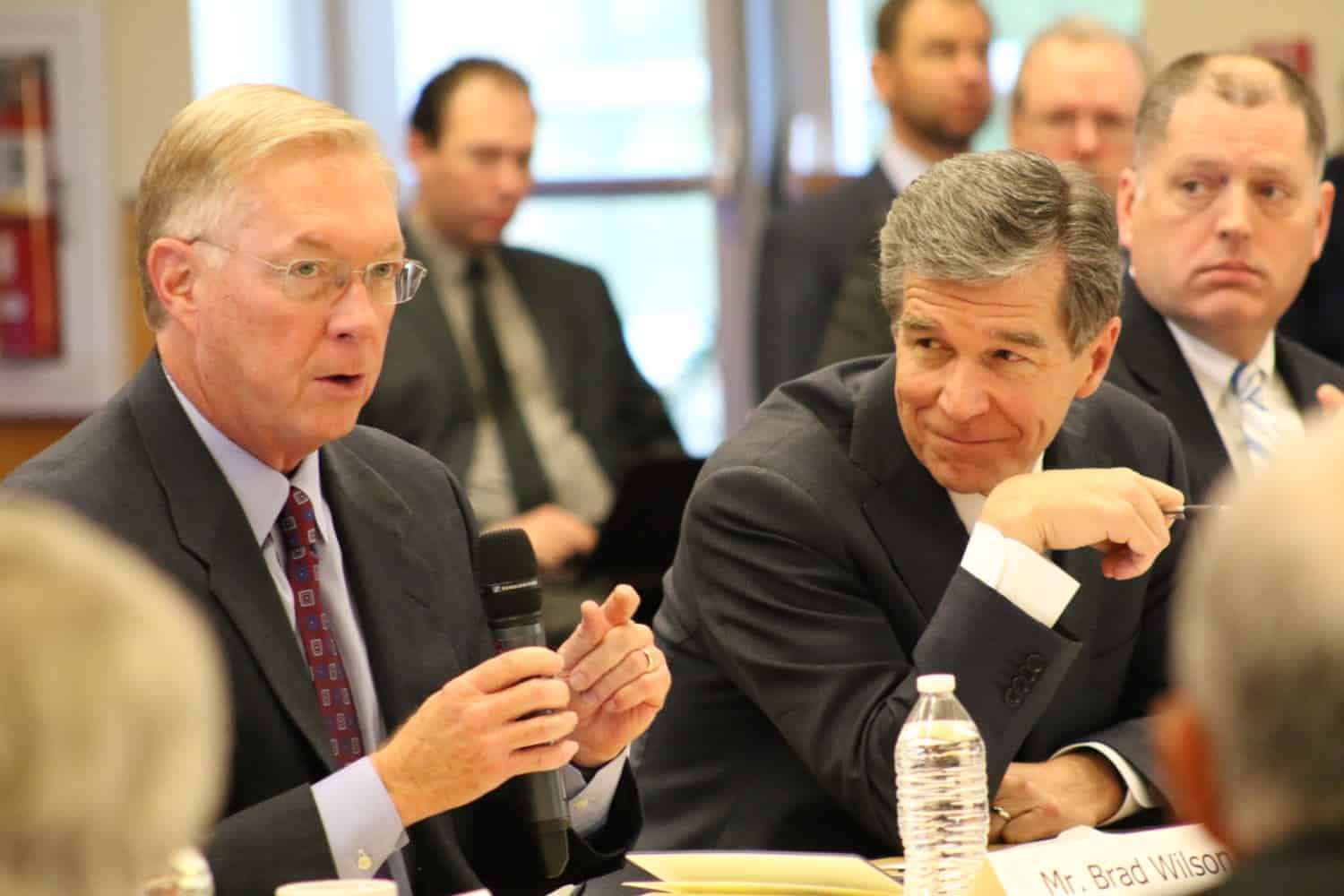A group of cross-sector stakeholders is addressing the state’s court-defined failure to provide “a sound basic education” to every child across the state. The 19-member commission, appointed by Gov. Cooper, met Thursday for the first time to study how to implement findings of the decades-long Leandro case.
“I think all of us should and can admit that we have struggled in this state to live up to that constitutional requirement,” Cooper said. “Hence, the state is in court again with more litigation regarding actual performance of Leandro. We’ve talked with plaintiffs’ attorneys. We’ve talked to people in the Attorney General’s office. We’ve talked to legislators. We’re here today to correct that course. And we want to lay out a plan to correct that course.”
The commission, called the Governor’s Commission on Access to Sound, Basic Education, was created by a Cooper executive order and is made up of individuals from the education, judicial, business, nonprofit, public safety, and government spheres — a group Cooper said Thursday is “both cohesive but also providing different points of view.” The commission’s goal is ambitious: to gather information on how to fix a system the court has determined is broken.
“This is just not an ordinary study commission,” Cooper said. “This is a commission that has the potential to change the course of our state.”
Both sides of the Leandro case filed a joint motion in July calling for an outside education consultant to develop a plan on how the state should meet the court’s 2002 findings. According to the motion, the commission is supposed to work with the consultant in creating that plan. Emergency Superior Court Judge David Lee, assigned the case in 2016 after Judge Howard Manning’s decades-long oversight, has not yet approved the motion or the outside consultant.
Commission members heard from Larry Armstrong, an attorney for Halifax County Public Schools who has worked on the case since its inception; Eddie Speas, who represented the public school system in Leandro; and Melanie Dubis, the plaintiffs’ lead counsel. The Leandro case began in 1994 when families from five low-wealth counties sued the state, claiming their kids were not receiving an equal level of education as students in more affluent districts. In 1997, the Supreme Court ruled unanimously that the every child has a fundamental right to the “opportunity to receive a sound basic education.”
Speas gave the commission advice he thought Judge Manning would want to be mentioned.
“We’ve got a lot of kids who aren’t achieving a sound basic education as measured by the particular test at that time,” Speas said. “And it’s not because of the curriculum, and it’s not because of the teachers so much. It’s because these kids are at risk. A lot of these kids are at risk and they need special help.”
Dubis described the decades of litigation as “one step forward, two steps back.” She outlined some successes from 2004 to 2009: new funding for disadvantaged students, expansion of pre-K, teacher pay increases. Then, she said the Great Recession came. Dubis said North Carolina saw heavy teacher pay decreases, along with the elimination of the teacher fellowship program and educator preparation enrollment decreases.
“We hope that we’ll be able to agree, at the end of the process, on a plan that you all have significant input in, that the court can put in place really to finally achieve what this lawsuit started out to achieve…,” Dubis said.
The 2002 requirements the court ruled are needed to meet its obligation, held up by the Supreme Court in 2004 and revisited by the commission now, are:
- “A ‘competent, certified, well-trained teacher who is teaching the standard course of study’ in every classroom;
- A ‘well-trained competent principal with the leadership skills and ability to hire and retain competent, certified and well-trained teachers’ in every school; and
- The ‘resources necessary to support the effective instructional program’ in every school ‘so that the educational needs of all children, including at-risk children, to have an equal opportunity to obtain a sound basic education, can be met.’”
There were multiple questions from commission members on the timeline of their work and the relationship the commission would have to the consultant, if hired by the judge.
Brad Wilson, commission chair and CEO of Blue Cross and Blue Shield of North Carolina, said he sees the consultant’s job as focusing on the details of the “what” — what steps should be taken to bring the state into alignment with the above requirements. The commission, Wilson said, will figure out the “how.”
“How would we advise and recommend to the governor, and other policy leaders in our state, how to get from here to there and the implementation of that which the consultant will provide to us as to the answer on ‘what?'”
Commission members shared different top educational concerns from funding to early childhood education. Sharing from an educator preparation point of view, Fouad Abd-El-Khalick, dean of UNC-Chapel Hill’s school of education, stressed the importance of the quality and placement of teachers and principals.
“The thing that we need to work through are not only the ways and means to prepare the most high-qualified teachers and principals. We have very good ideas about how to do that. The second thing we need to work through is how do you place the most qualified teachers and principals to the least privileged communities.”
Executive Director of the North Carolina Justice Center Rick Glazier focused on state funding, noting the state’s funding is still below pre-Recession levels and behind other states.
“We’ve never really done in North Carolina, under either Democratic or Republican administrations, a serious and rigorous adequacy study that has to sort of get at the core of Leandro.”
President of Vance-Granville Community College Stelfanie Williams said she has seen a disparity between the post-secondary readiness of students from privileged backgrounds and those who receive the baseline high school education.
“The demands of college and career — often there is a gap between that and what is considered an adequate education at the high school level. And so I just hope, as a commission, that we will really aim with the aspirational goal of an innovative, advanced education for all children.”
Greene County Schools Superintendent Patrick Miller highlighted the difference in levels of local funding between affluent and poor districts. He estimated Orange County’s budget to have about $11 million more in local expenditures than his own county.
“You see what a huge gap we have in equity of resources, and resources don’t always mean money,” Miller said.
Jim Deal, a Boone attorney and former school board chair in Watauga County, said he fears people have lost respect for the teaching profession.
“Once upon a time, teachers were the most valued profession in our community, and they were talked about as the most valued profession in our community,” Deal said. “Now it’s like they’re under attack. They’re having to defend themselves all the time. To me, that’s a fairly simple thing we can do fairly early, is change the dynamic of the conversation. Teachers are the most important part of our workforce.”
Geoff Coltrane, Cooper’s senior education adviser, gave an overview of other commissions working on a variety of educational issues.
My Future NC, a commission created through UNC General Administration, is engaging all sections of the education continuum, along with members of the business, government, nonprofit, and philanthropy communities. The commission is setting statewide educational goals and making policy recommendations on how to attain them. Its first meeting, outlining the mission of the group, was in early November.
Coltrane also noted the Joint Legislative Task Force on Education Finance Reform, which is made up of 19 legislators and is studying the the way the state distributes funding to the state’s public schools. The task force met in November and started discussing the possibility of switching from an allotment system to a weighted student formula, where money is attached to individual students.
Coltrane went on to explain another new commission, the NC Professional Educator Preparation and Standards Commission (PEPSI). The group is responsible for the oversight of educator preparation programs and teacher licensure, and it will permanently report to the State Board of Education. The commission is comprised of eight appointees from each the House and the Senate as well as Superintendent of Public Instruction Mark Johnson and Teacher of the Year Lisa Godwin. In November, the commission met to pass its bylaws and recommendations to the board on policies including accountability requirements, content and pedagogy, and school administrator programs.
Finally, Coltrane highlighted the B3 Interagency Council, created by the legislature’s most recent budget. The group is led by leaders from the Department of Health and Human Services and the Department of Public Instruction to coordinate early education efforts in both agencies and improve the birth to third grade continuum. Two members of the House and the Senate, along with four appointees by each the House and the Senate are also on the council.
Editor’s Note: Judge David Lee is the father of EducationNC Managing Editor and Content Director Laura Lee. Mebane Rash edited this article.



